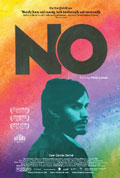
Directed by
Pablo Larrain
115 minutes
Rated M
Reviewed by
Bernard Hemingway

No
Synopsis: In 1988, after 15 years of rule by General Augusto Pinochet, the United States, which helped him oust democratically-elected Salvador Allende, has insisted that he have a referendum on his presidency. Whilst the “No” camp believes that the whole thing is a set-up to validate the dictatorship, through family connections a coalition of 16 opposition parties approach advertising hot-shot René Saavedra (Gael García Bernal) to head-up a media campaign for a "No" vote.
Political films often have a strident quality both in terms of their scripting and their formal realization, a quality that undoubtedly reflects the makers' passion but is none the less often distancing. Director Pablo Larrain avoids this trap with his understated approach to his material whilst in no way lessening the strength of his film. In a way his strategy is a reflection of the central issue that in the film the proponents of the “No” campaign face: is it better to tell the truth and lose their fight or to dissemble and win. Whilst the anti-regime activists understandably want to reveal the abominable cruelties of the Pinochet dictatorship, Bernal’s ad-man Saavedra is ready to sugar-coat that pill as long as it realizes his client’s brief – to remove Pinochet.
Larrain cannily lets his subject matter speak for itself. Technically the film is shot much in the manner of a home movie of the period – the format is nearly square, the images are grainy and leached of colour, sometimes the camera, which is often hand-held, shoots into sun - all with the purpose of eschewing Hollywood gloss.
Similarly, although, there is a minor sub-plot involving the relationship between Saavedra and his former wife, Larrain keeps squarely focussed on the unfolding of events. Seamlessly integrating archival footage into the dramatization of the 27 day television campaign leading up to the plebiscite and cleverly compressing the narrative through editing, he creates a feeling of escalating tension without resorting to plot contrivances. In this same spirit of unobtrusiveness Bernal is a good choice for the lead – although he seemed to me a little young for the role, he blends into his surroundings, performance-wise in no ways standing out more than the narrative requires. Of the remaining cast, most of whom I assume are Chilean (Bernal is Mexican), there is no-one I recognised.
The strength of No is its underlying reality and Larrain has successfully brought that to light. To see a dictator fall, even to be pushed, onto his sword is a bonus to this deftly-crafted chapter from Chile's hard-won evolution to democracy.

Want more about this film?


Want something different?




